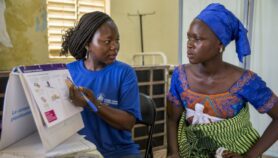21/04/22
Efforts to curb gender violence ‘reap economic rewards’

Send to a friend
The details you provide on this page will not be used to send unsolicited email, and will not be sold to a 3rd party. See privacy policy.
[CAPE TOWN] Community-based interventions to prevent violence against women and girls could benefit women’s health and economic outcomes, even where resources are most limited, a study suggests.
Projects to raise awareness of gender-based violence in schools and local communities, and initiatives to change behaviours toward women and girls, as well as laws to protect them, could also improve mental health, according to the study published last month (24 March) in PLOS Medicine.
The study aimed to provide evidence that investment in programmes to prevent violence against women, particularly in low- and middle-income countries, pays off.
“Each country will have to choose which interventions to implement based on its own specific violence against women and girls problems and needs.”
Giulia Ferrari, London School of Economics
“We find that nearly all the interventions evaluated demonstrate a positive impact on health and economic well-being,” the study says. “Considering all effects, interventions that improve participants’ livelihood skills, including their financial management skills, can be cost saving, while also reducing perpetration of violence from men, even if they do not reduce experience of (physical or sexual) violence among women and girls in the short term.”
The researchers assessed the effectiveness and value for money of interventions including meetings and workshops for 11- to 14-year-olds and adults, designed to prevent violence against women and girls in Ghana, Kenya, Pakistan, Rwanda, South Africa and Zambia from 2015 to 2018.
Workshop-based interventions showed promise in South Africa, among poor women eligible for access to microfinance services in around cities such as Khayelitsha and Gugulethu, on the outskirts of Cape Town and among unemployed youth, according to the study.

Giulia Ferrari, a co-author of the study and a research fellow at the London School of Economics’ Centre for Women, Peace and Security, says that the most surprising finding is that interventions to prevent violence against women and girls not only reduce violence but have several positive effects on other areas of people’s lives such as improving mental health and incomes.
Community-based interventions that did not set out to tackle economic empowerment also seem nevertheless to have had a positive impact on women’s economic outcomes, adds Ferrari.
And even interventions that did not directly tackle depression or anxiety resulted in improvements in participants’ mental health, albeit with modest effects on intimate partner violence prevention, she says.
Tried and tested community-based interventions that have worked locally are very likely to be cost-effective, on account of being cheap and reasonably effective, while other interventions, such as counselling, are more effective but also exponentially costlier, she says.
“This does not mean they should not be considered for implementation, but it really shows that each country will have to choose which interventions to implement based on its own specific violence against women and girls problem, and needs to consider all intervention types in combination,” she explains.
According to the study, the cost-effectiveness of the interventions was different across the various countries.
“From a societal perspective, per participant results range from a net saving of US$356 in Ghana to a net cost of US$1,809 in South Africa,” the study says.
Judy Gitau, Africa regional coordinator for Equality Now, tells SciDev.Net that the study is significant as efforts to tackle sexual and gender-based violence are usually focused on response measures.
“It is important therefore to have research and data making a case for preventative measures since this will work to address the root problem and not just deal with the consequences, some of which are fatal,” Gitau explains.



Non-governmental organisations and governments should use the study’s findings to support programmes that engage communities in deconstructing gender relations at the source, she says.
Gitau believes that having robust data about violence against women and girls is crucial because it quantifies the problem, provides evidence that can be used to develop policies and programmes, and forms a baseline from which the scale and effectiveness of interventions can be measured.
“We need more studies in more locations and at larger scale to assess the full extent of interventions’ impacts and their cost-effectiveness,” Ferrari adds.
This piece was produced by SciDev.Net’s Sub-Saharan Africa English desk.













